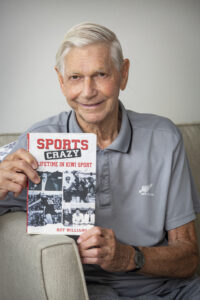
When he was a child, Roy Williams’ father – a WWI veteran and strict disciplinarian – firmly told him and his sister to, “never be afraid of hard work – hard work never hurt anyone”.
This lesson, amongst many given by their father, was one the two took to heart.
For, through grit, determination and talent, Roy would become a Commonwealth Games gold medallist, and his sister, Yvette, the first woman from New Zealand to win an Olympic gold medallist.
Born in Dunedin in 1934, Roy was instantly sports-crazy. He would wrestle and play games with his sister, and later would engage in cricket and rugby.
A well-known sports journalist wrote, years ago, that the “Williams family (Roy and Yvette) were so competitive they wouldn’t have let a four-year-old beat them at Ludo”.
In 1946 and 1947, he won the Otago primary-intermediate schools’ 75-yard hurdles championships, the first victory in his long and successful athletics career.
In 1947, in his rugby school team, Roy scored the winning try in front of a capacity crowd of 30,000.
It was watching Yvette win gold in long jump and silver in javelin at the British Empire Games that inspired Roy to want to represent New Zealand, as either a rugby player or an athlete.
And it was seeing Yvette win her Olympic title in 1952 that gave him the motivation and drive to train as hard as he could.
“I was 17, and at an impressionable age,” Roy wrote in his book. “And although what happened was really no one’s fault, it really upset me. I decided then that I did not want to live the rest of my life in Yvette’s shadow – as her little brother.”
After he graduated, Roy majored in physical education at Dunedin Teachers’ Training College.
In 1956, he broke the New Zealand decathlon record by 520 points. By 1960, he’d won his fifth NZ decathlon championship and two years later he toured Australia and Asia for six weeks with the NZ basketball team.
Roy, his late wife Ngaire, and life-long friend Les Mills travelled to the United States to the University of Southern California. Roy majored in physical education and competed and trained in the university’s track and field team.
“I taught physical education for two-three years and continued to compete. It was difficult teaching and training as I was training three hours a day, five days a week,” Roy says.
One of Roy’s long-term goals for his career was to win an Olympic medal. However, quite controversially, he was never picked by the New Zealand Olympic selectors despite being eighth in the world in decathlon by the 1964 Tokyo Olympic Games.
Peter Snell told a major NZ newspaper that the “national administration had become a major dictatorship” and used Roy’s exclusion as a prime example. “To refuse him selection for Tokyo on the basis of reasons which were proved publicly to be non-existent was a thoroughly bad decision.”
After returning from the US, Roy became a sports reporter for the Auckland Star where he would work for 25 years. He went on to cover several All Blacks tours and Olympic Games.
In 1966, with the Olympic rejections behind him, Roy won gold at the Commonwealth Games in 1966 in Jamaica, despite difficult conditions and illness.
“It was right on the equator,” he says. “It was 100 per cent humidity.”
On how he felt about winning, Roy says he was “totally exhausted, but thrilled”.
The same year, he was named New Zealand Sportsman of the Year.
Roy and Ngaire were present at the 1972 Munich Olympic Games when eight members of the Palestinian terrorist group took nine members of the Israeli Olympic team hostage, after killing two more. “I saw one of the Israelis lying in a pool of blood, right in the middle of the Games Village,” he says. “It was quite emotional.”
Along with his training and journalism, Roy also started coaching. Several of his students went on to have successful athletic careers.
Now retired and living at Pakuranga Park Village, Roy enjoys exercising, watching sport and spending time with friends and family.
His pick for the winner of this year’s Super Rugby is the Blues.










